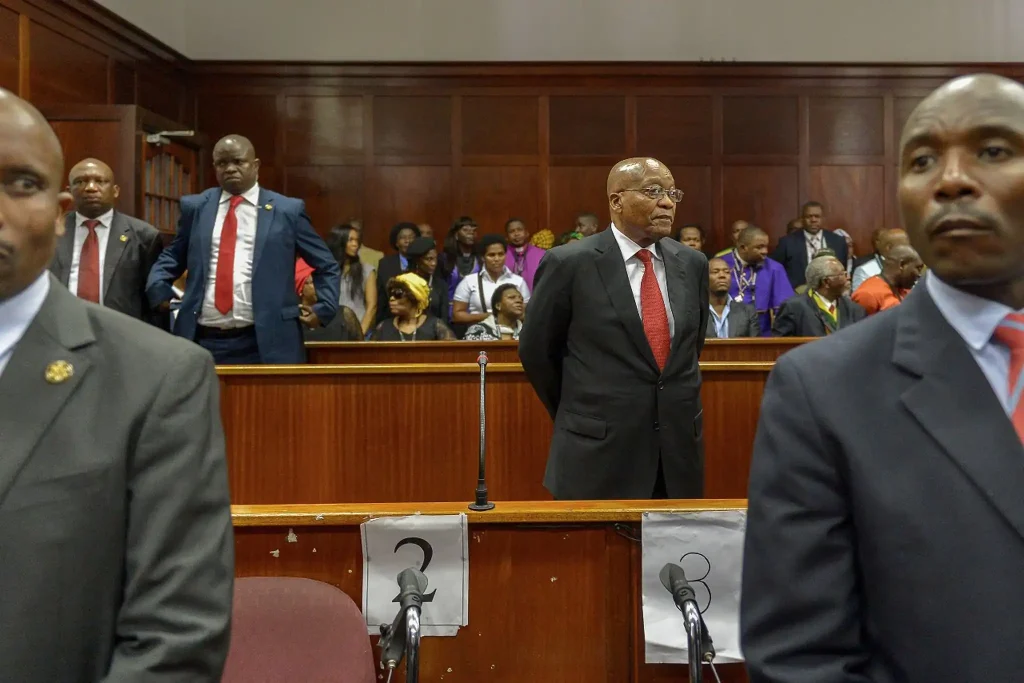On Tuesday, June 3, 2025, a South African High Court judge dismissed an application by former President Jacob Zuma to terminate his long-standing corruption trial, marking another chapter in one of South Africa’s most high-profile legal battles.
Zuma, alongside French multinational company Thales, faces 18 charges, including corruption, money laundering, fraud, tax evasion, and racketeering.
These charges are linked to a controversial multibillion-rand arms deal from 1999, a scandal that has haunted South African politics for over two decades.
Zuma and Thales’ Failed Bid for Dismissal
Zuma and Thales sought to have the charges dropped, arguing that repeated delays and the death of two key witnesses had irreparably prejudiced their right to a fair trial.
However, the presiding judge rejected their application, noting that the state had convincingly argued that the delays were primarily caused by Zuma’s legal maneuvers, with Thales contributing to a lesser extent.
The judge refrained from assigning explicit blame but emphasized that the case’s prolonged timeline did not justify dismissing the charges.
A Decade of Delays and Legal Challenges
The trial, which began over a decade ago, has been plagued by numerous postponements, legal challenges, and procedural disputes.
The state declared itself trial-ready in 2021, but progress has been stalled by Zuma’s persistent efforts to remove lead prosecutor Billy Downer.
Zuma’s legal team has repeatedly claimed that Downer lacks the independence and impartiality required to prosecute the case fairly.
These attempts have been unsuccessful, further prolonging the legal process and fueling public debate about the accountability of South Africa’s political elite.
The 1999 Arms Deal and Zuma’s Role
At the time of the 1999 arms deal, Zuma served as South Africa’s deputy president, a position that placed him at the heart of the controversial procurement process.
The charges against him also include allegations of a corrupt relationship with his former financial advisor, Schabir Shaik.
In 2005, Shaik was convicted on two counts of corruption and one count of fraud, with the presiding judge describing “overwhelming” evidence of a corrupt relationship between Shaik and Zuma.
This conviction intensified scrutiny on Zuma, whose political career has since been marred by legal battles and accusations of systemic corruption.
A Scandal That Defines a Nation
The arms deal scandal has long been a lightning rod for criticism of South Africa’s post-apartheid government, with allegations of kickbacks and mismanagement casting a shadow over the country’s democratic institutions.
The case against Zuma and Thales is seen as a critical test of South Africa’s ability to hold powerful figures accountable, particularly in a nation grappling with widespread corruption and public distrust in governance.
What’s Next for the Trial?
Following Tuesday’s ruling, the corruption case has been postponed to December 4, 2025, when the state will apply for the trial to move forward, regardless of any appeals launched by Zuma or Thales.
This development has sparked renewed discussions about the pace of justice in South Africa and the challenges of prosecuting complex, high-profile cases.
For Zuma’s supporters, the trial represents a politically motivated attack, while critics argue it is a crucial step toward rooting out corruption at the highest levels.
Implications for South Africa’s Future
As South Africa awaits the next phase of the trial, the case continues to highlight deep-seated issues of accountability, governance, and the rule of law.
The outcome could have significant implications for Zuma’s legacy and the broader fight against corruption in South Africa.
With the December court date looming, all eyes remain on the judiciary to deliver justice in a case that has already spanned over two decades.























